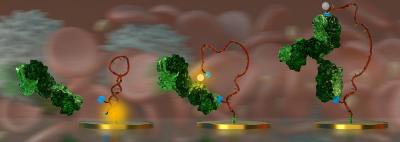Taking inspiration from nature, bioengineers at the University of California at Santa Barbara in conjunction with bioengineers from University of Rome Tor Vergata have devised an affordable diagnostic test that takes only minutes to administer.
 An electrochemical DNA-switch (red ribbon) detects its target antibody (green) directly in blood. (Credit: Peter Allen)
An electrochemical DNA-switch (red ribbon) detects its target antibody (green) directly in blood. (Credit: Peter Allen)
The researchers believe that their design can radically affect world health by paving the way for developing point-of-care devices that facilitate rapid detection of allergies, sexually transmitted diseases (STD) and autoimmune diseases. The new diagnostic method adopts a DNA switch of nanoscale dimensions with capability to sense antibodies corresponding to a host of diseases.
The primary limitation of existing diagnostic techniques inspite of the advancements made is that they require laboratory analysis. Considerable time is consumed transporting the sample to the lab, getting it analyzed and subsequently sending the results to the point of care. The new method moves diagnosis to the point of care and eliminates the time lapse between diagnosis and treatment and reduces risk of disease transmission, especially in case of infectious diseases like STD.
The researchers came up with the design after observing nature’s sensing mechanism. All living organisms employ molecular nanoswitches that change their structure to serve as warning for the presence of specific targets. The researchers devised synthetic nanoswitches that indicate their state through an alteration in electric current. By using low-cost electronics like those employed in home glucose test meters, the current change can be measured. The nanoswitches were found to detect the presence of anti-HIV antibodies in blood in a span of five minutes.
The researchers estimate the time to market of the device to be several years.